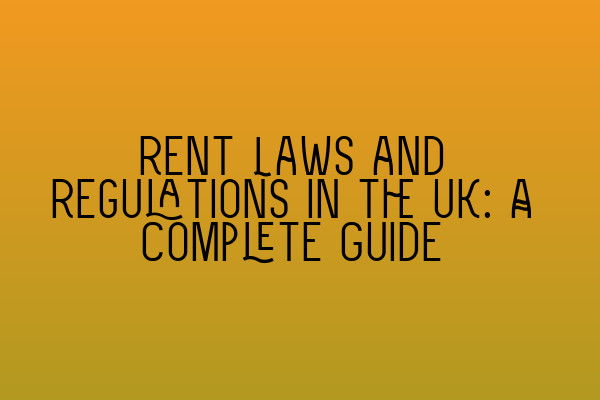Rent Laws and Regulations in the UK: A Complete Guide
Understanding the rent laws and regulations in the UK is essential for both landlords and tenants. Whether you are a property owner looking to rent out your space or a tenant searching for a suitable place to live, knowing your rights and responsibilities is crucial. In this comprehensive guide, we will walk you through the key aspects of rent laws in the UK, providing you with valuable information to navigate the rental market.
Introduction to Rent Laws
Rent laws are designed to protect the interests of both landlords and tenants. These laws establish the legal framework within which rental agreements operate and outline the rights and responsibilities of each party involved. By understanding the rent laws, you can ensure a fair and respectful rental experience for all parties.
Types of Tenancies
In the UK, there are various types of tenancies, each with its own set of regulations. The three main types of tenancies are:
- Assured Shorthold Tenancy (AST)
- Assured Tenancy
- Regulated Tenancy
The most common type of tenancy is the Assured Shorthold Tenancy (AST). This type of tenancy provides the landlord with the right to regain possession of the property after a fixed-term period. ASTs offer tenants a minimum term of six months, providing them with certain protections under the law.
Assured Tenancies and Regulated Tenancies are less common but still exist in some cases. These tenancies offer tenants more security and protection, with stricter regulations surrounding rent increases and eviction.
Rent Increases
Landlords have the right to increase the rent during a tenancy, but there are specific rules and procedures that must be followed. The frequency and amount of rent increases depend on the type of tenancy and the specific terms outlined in the rental agreement.
For ASTs, landlords can increase the rent by serving a Section 13 Notice, which must be in writing and comply with the legal requirements. This notice must be served at least one month before the proposed increase and should specify the new rent amount and the date it will take effect.
Assured Tenancies and Regulated Tenancies have their own rules regarding rent increases, which often require the landlord to obtain permission from a rent assessment committee or a tribunal.
Deposits
Landlords in the UK are legally required to protect their tenants’ deposits using a government-approved tenancy deposit scheme. This scheme ensures that tenants’ deposits are safeguarded and made available for return at the end of the tenancy, minus any deductions for damages or unpaid rent.
There are three government-approved tenancy deposit schemes:
- Deposit Protection Service (DPS)
- MyDeposits
- Tenancy Deposit Scheme (TDS)
Landlords must provide tenants with the prescribed information about the deposit protection scheme within 30 days of receiving the deposit. This information includes details about the scheme used, the deposit amount, and how to apply for its return at the end of the tenancy.
Evictions
If a landlord wishes to evict a tenant, they must follow the correct legal process. The eviction process is different for each type of tenancy, and it’s essential to adhere to the specific regulations to avoid any potential legal issues.
For ASTs, landlords can use either a Section 21 Notice or a Section 8 Notice for eviction. A Section 21 Notice allows a landlord to evict a tenant without providing any specific reason, as long as they have served the notice correctly. A Section 8 Notice is used when there is a breach of the tenancy agreement by the tenant.
Assured Tenancies and Regulated Tenancies have their own eviction procedures, which often require a valid reason for eviction, such as the tenant’s failure to pay rent or anti-social behavior.
Renting Safely and Legally
Whether you are a landlord or a tenant, it’s crucial to understand and comply with the relevant rent laws and regulations to ensure a safe and legal rental experience. As a landlord, you must fulfill your responsibilities in terms of protecting deposits, providing the required information, and following the correct eviction procedures. As a tenant, you have rights to fair treatment, peaceful enjoyment of the property, and protection against unfair eviction.
By educating yourself on rent laws, you can protect your interests and maintain a harmonious relationship with your landlord or tenant. If you need further guidance on rent laws or seek legal advice, don’t hesitate to contact SQE Property Law & Land Law, the leading experts in property law in the UK.
To prepare for the upcoming SQE exams, we offer practice resources and comprehensive preparation courses. Check out these related articles:
- SQE 1 Practice Exam Questions
- SQE 1 Practice Mocks FLK1 FLK2
- SQE 2 Preparation Courses
- SQE 1 Preparation Courses
- SRA SQE Exam Dates
Stay informed, stay compliant, and protect your rights in the rental market with SQE Property Law & Land Law.
